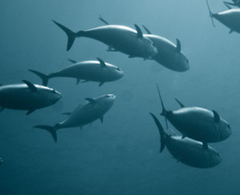 Sustainable methods of fishing are often touted for environmental benefits. But a new report finds they also yield more wealth than current techniques for communities that rely on them.
Sustainable methods of fishing are often touted for environmental benefits. But a new report finds they also yield more wealth than current techniques for communities that rely on them.
The study, from researchers at the University of California Santa Barbara, the University of Washington, the Environmental Defense Fund and the Economist Intelligence Unit, finds that sustainable management of global fisheries may increase their economic benefits by $51 billion each year in the next 10 years. Improving fisheries management, the report argues, is a “win for conservation, catch, and profits.”
The analysis looked at 4,373 fisheries around the world, and found that those with sustainable management plans — with policies and regulations that ensure a species isn’t overfished and that prohibit environmentally hazardous fishing techniques — were more profitable than those without them. In every country they looked at, the benefits of sustainable policies outweighed the costs by an average ratio of 10 to 1.
“To be quite honest, we expected there would be significant tradeoffs,” Christopher Costello, a professor of resource economics at UC Santa Barbara who was lead co-author of the report, told The Huffington Post. “Maybe you would sacrifice food provision for economic prosperity, or ecosystem integrity for food. And we found that there weren’t.”
Sustainable management could increase global fish production 14%, which would produce an additional 12 million metric tons of seafood, according to the study.
“We try not to focus on the story of everything going downhill. We try to focus on how much there is to be gained,” said Amanda Leland, the senior vice president for oceans at the Environmental Defense Fund.
The report argues that fisheries are a key part of what has been called the “blue economy,” which focuses on the ocean as a source of wealth. Marine fisheries account for $270 billion of global gross domestic product, the report argues, and “well-managed, sustainable fisheries can generate economic value, well beyond their current levels.”
The report was released ahead of World Oceans Week.
“We hope that, at the global level, it’s a wakeup call,” said Costello. “Look at this huge opportunity we’re leaving on the table. If you care about conservation, economic prosperity, or food security — it’s the same thing.”
